Tropical mosquito and tick-borne viruses have already been detected in Britain and more are coming.
That is the warning from the UK Health Security Agency as it sets up a new early warning system to help detect outbreaks as climate change brings mosquitos up from southern Europe. The joint project with NHS Blood and Transplant will initially look to detect tick-borne encephalitis virus (TBEV), Usutu virus and West Nile virus.
All can cause encephalitis, which is brain inflammation caused by a viral infection which leads to pressure on the skull. Symptoms can include fever, headache, malaise, sudden confusion or change in behaviour, loss of movement in arms and legs, facial dropping, change in vision or slurred speech. In extreme cases it can cause disorientation, coma and death.
(
European Centre for Disease Prevention and Control)
Ticks carrying TBEV have been found in Thetford Forest in East Anglia, woodland on the Hampshire and Dorset border, the New Forest, and the North Yorkshire Moors. Four cases have been found in humans linked to exposure in the New Forest, Hampshire and the North Yorkshire Moors. The UKHSA says the risk of TBEV to the general public is still considered very low.
No human cases of Usutu or West Nile viruses contracted in the UK have been identified. But Usutu has been found in birds in the UK and mosquitos that can spread West Nile virus have been recently detected in the south of England.
But scientists have been monitoring British wetlands for years amid fears even more deadly diseases could be coming in the decades to come. A UKHSA report last year forecast that the warming climate will see dengue fever and Zika virus – which can cause birth defects – arrive in the UK by the 2040s and 2050s.
The Mirror joined its scientists on the front line of defence against invading mosquitos five years ago. They said single Asian tiger mosquitoes, carried by lorries crossing the Channel, have been detected across South East England. These mosquitoes can carry dengue, Zika and chikungunya virus.
Speaking at a key habitat for the insects on the Somerset Levels, near Glastonbury, team leader Dr Jolyon Medlock said: “We are trying to delay or prevent the establishment of these invasive species. These mosquitoes are wily, they lay eggs that survive the winter, and are difficult to control once established.”

(
Getty Images)
Traps cover wetlands in Kent, Cambridgeshire, The Humber, Midlands, the North East and North West while scientists monitor for mosquitoes at sea ports and airports and key highway locations.
The presence of disease carrying insects is not enough for tropical diseases to thrive, as viruses and parasites must be able to replicate and survive in their new environment. Some experts say this could take 40 years while others predict it will happen sooner.
This post was originally published on here







